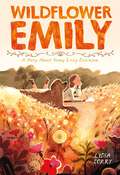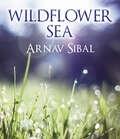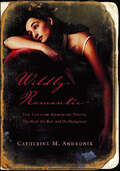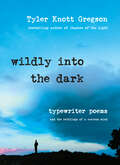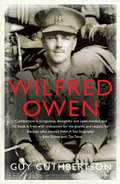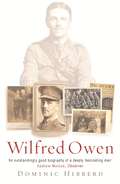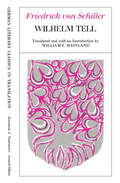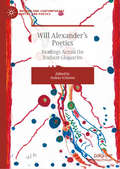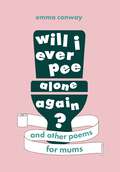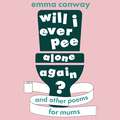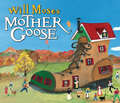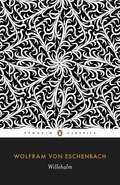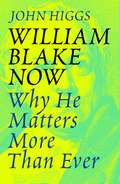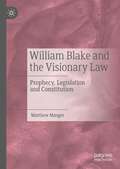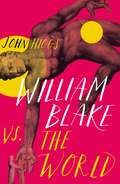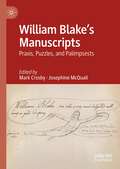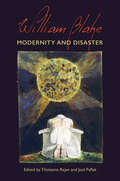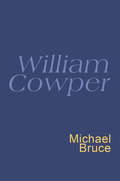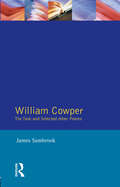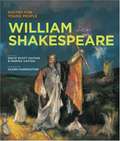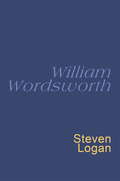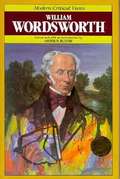- Table View
- List View
Wildflower Emily: A Story About Young Emily Dickinson
by Lydia CorryEmily Dickinson is one of America’s greatest and most original poets of all time. When you hear her name, you may imagine the famous recluse whose withdrawal from society became legendary. But it’s time to meet a new side of Emily, one that is powerful, adventurous, and joyful. Follow along as we delve into Emily Dickinson’s childhood, revealing a young girl desperate to go out exploring—to meet the flowers in their own homes. Wade through tall grasses to gather butterfly weed and goldenrod, the air alive with the “buccaneers of buzz.” And, don’t forget to keep a hot potato in your pocket to keep your fingers warm.This is Emily Dickinson as you’ve never seen her before, embarking on an unforgettable journey in her hometown of Amherst, Massachusetts, with her trusty four-legged companion, Carlo.
Wildflower Sea
by Arnac SibalLife is an ocean for him.His mind is his boat.Arnav Sibal, also known as ‘The Poet in Pyjamas’, according to his parents, lives in his own world. However, he cherishes the reality voyage that is life.At 17, he is driven to explore, to fail and ultimately learn, something that keeps his family and his teachers in a constant state of worry. He believes that it will be a long time before he finds himself and that is why he cannot pass up any opportunity of adventure. Driven by the idiosyncrasies of life, he says that every person is an ocean with numerous islands of ideas. Some express while some do not. Writing is his means of expression. He says it is through the black ink on white paper that he prefers to convey detailed multi-coloured paintings to his fellow people.This book is a compilation of ideas and observations that he has made during the course of his travels. Moved by life’s quirkiness, even the tiniest wave rocks him and he pens it down.The poems, short stories and tapestries in this book are dear to him because the events that inspired them moved him. They are the wind in his sails.This anthology is his gift of wind to you. We all learn something from each other. These events pushed him. He hopes they move you too.
Wildly Romantic: The English Romantic Poets: The Mad, the Bad, and the Dangerous
by Catherine M. AndronikMeet the rebellious young poets who brought about a literary revolutionRock stars may think they invented sex, drugs, and rock and roll, but the Romantic poets truly created the mold. In the early 1800s, poetry could land a person in jail. Those who tried to change the world through their poems risked notoriety—or courted it. Among the most subversive were a group of young writers known as the Romantics: Lord Byron, Percy Bysshe Shelley, Samuel Taylor Cole-ridge, William Wordsworth, and John Keats. These rebels believed poetry should express strong feelings in ordinary language, and their words changed literature forever. Wildly Romantic is a smart, sexy, and fascinating look at these original bad boys—and girls.
Wildly into the Dark: Typewriter Poems and the Rattlings of a Curious Mind
by Tyler Knott GregsonThe most intimate and eclectic poetry collection yet from bestselling author and online sensation Tyler Knott Gregson With loyal fans around the world and across the internet, Tyler Knott Gregson is reinventing poetry for a new generation, using Instagram and Tumblr to reach readers where they are. Tyler&’s third collection includes more of his popular Typewriter Series poems (featured in his first book, Chasers of the Light) as well as never-before-published scenes that paint the world as only Tyler sees and experiences it. Filled with vivid photographs and even more vivid emotions, Wildly Into the Dark is a must-have for longtime fans as well as newcomers to Tyler's unique brand of passionate, intimate, and playful words and images.
Wilfred Owen
by Guy CuthbertsonOne of Britain's best-known and most loved poets, Wilfred Owen (1893-1918) was killed at age 25 on one of the last days of the First World War, having acted heroically as soldier and officer despite his famous misgivings about the war's rationale and conduct. He left behind a body of poetry that sensitively captured the pity, rage, valor, and futility of the conflict.In this new biography Guy Cuthbertson provides a fresh account of Owen's life and formative influences: the lower-middle-class childhood that he tried to escape; the places he lived in, from Birkenhead to Bordeaux; his class anxieties and his religious doubts; his sexuality and friendships; his close relationship with his mother and his childlike personality. Cuthbertson chronicles a great poet's growth to poetic maturity, illuminates the social strata of the extraordinary Edwardian era, and adds rich context to how Owen's enduring verse can be understood.
Wilfred Owen: The definitive biography of the best-loved war poet
by Dominic HibberdThe definitive biography of the war poet - 'Dominic Hibberd has probably done more more than any other individual to illuminate Owen's life and work. His new Life is a triumph ... it is difficult to believe it will ever be superseded' Mark Bostridge, The Independent on SundayWhen Wilfred Owen died in 1918 aged 25, only five of his poems had been published. Yet he became one of the most popular poets of the 20th century. For decades his public image was controlled by family and friends, especially his brother Harold who was terrified anyone might think Wilfred was gay. In recent years much new material has become available. This book, based on over thirty years of wide-ranging research, brings new information to almost every part of Owen's life. Owen emerges as a complex, fascinating and often endearing character with an intense delight in being alive.
Wilfred Owen: The definitive biography of the best-loved war poet
by Dominic HibberdThe definitive biography of the war poet - 'Dominic Hibberd has probably done more more than any other individual to illuminate Owen's life and work. His new Life is a triumph ... it is difficult to believe it will ever be superseded' Mark Bostridge, The Independent on SundayWhen Wilfred Owen died in 1918 aged 25, only five of his poems had been published. Yet he became one of the most popular poets of the 20th century. For decades his public image was controlled by family and friends, especially his brother Harold who was terrified anyone might think Wilfred was gay. In recent years much new material has become available. This book, based on over thirty years of wide-ranging research, brings new information to almost every part of Owen's life. Owen emerges as a complex, fascinating and often endearing character with an intense delight in being alive.
Wilhelm Tell (German Literacy Classics in Translation)
by Friedrich von SchillerWhen Schiller completed Wilhelm Tell as a "New Year's Gift for 1805" he foretold that it would cause a stir. He was right. In the midst of Great Power politics a play which drew substance from one of the fourteenth-century liberation movements proved both attractive and inflammatory. Since then the work as become immensely popular. This new English translation by William F. Mainland brings out the essential tragi-comic nature of Wilhelm Tell but also emphasizes its impressive formal unity. Schiller based his play on chronicles of the Swiss liberation movement, in which Wilhelm Tell played a major role. Since Tell's existence has never been proven, Schiller, a historian by profession, felt he had to devise a figure who would bring the uncertainties and contradictions of the various Swiss chronicles into focus. Respected for his courage and skill with a bow, for his peaceable nature and his integrity, Schiller's archer—while always ready to aid his fellows—habitually seeks solitude. In the midst of political turmoil Wilhelm Tell is the nonpolitical man of action. Keenly interested in the problematic interplay of history and legend, Schiller turned it to be dramatic advantage. He constructed his play to illustrate the greatest possible development of the character traits suggested for Tell by the chronicles. The result of Schiller's supreme achievement in historical drama.
Will Alexander’s Poetics: Readings Across the Radiant Glossaries (Modern and Contemporary Poetry and Poetics)
by Joshua SchusterThis volume brings together academic and poetic essays which focus on Will Alexander&’s complete oeuvre. The collection explores Alexander&’s long career in African American avant-garde poetry, and sheds light on other genres of Alexander&’s work in addition to poetry, including: essays, plays, aphorisms, novels, dialogues and drawings. Each contribution contextualizes Alexander&’s work in the many traditions and literatures his work draws from, including African American poetics, ecopoetics, post-colonial and anti-colonial poetics, bio and geo-histories, and global practices of consciousness raising and spiritual transformation, among other topics. The volume also includes a new interview with Alexander, as well as one of his long unpublished poems. Alexander&’s writings are multi-generic and traverse many fields and states of consciousness. This edited collection thus provides a deep and sustained engagement with Alexander&’s work, surveying how it has transformed the landscape of poetics, the avant-garde, and the individual reader.
Will I Ever Pee Alone Again?: And other happy, heart-warming poems for mums
by Emma ConwayThere's a pyjama-clad woman from Brum,She's a mostly-happy (sometimes-snappy) mum,She's written some verse- it's a little perverse -and she hopes you find it side-splitting-ly fun!In her first book, happy-go-lucky YouTuber and Instagrammer Emma Conway explores motherhood in all its glory through the medium of hilarious and uplifting poetry. A mum to two young humans aged 7 and 9, she revisits the days of no sleep, potty training and toddler tantrums; dives deep into first days of school, sibling bickering and watching your babies grow into little people; and writes frankly about life after having kids, embracing the mum bod and giving zero sods. Written with huge amounts of warmth and love, and just the right amount of piss-takery, this is the reassuring hug-in-a-book you and all the mums in your life need.
Will I Ever Pee Alone Again?: And other happy, heart-warming poems for mums
by Emma ConwayThere's a pyjama-clad woman from Brum,She's a mostly-happy (sometimes-snappy) mum,She's written some verse- it's a little perverse -and she hopes you find it side-splitting-ly fun!In her first book, happy-go-lucky YouTuber and Instagrammer Emma Conway explores motherhood in all its glory through the medium of hilarious and uplifting poetry. A mum to two young humans aged 7 and 9, she revisits the days of no sleep, potty training and toddler tantrums; dives deep into first days of school, sibling bickering and watching your babies grow into little people; and writes frankly about life after having kids, embracing the mum bod and giving zero sods. Written with huge amounts of warmth and love, and just the right amount of piss-takery, this is the reassuring hug-in-a-book you and all the mums in your life need.
Will I Ever Pee Alone Again?: Poems for mums
by Emma ConwayThere's a pyjama-clad woman from Brum,She's a mostly-happy (sometimes-snappy) mum,She's written some verse- it's a little perverse -and she hopes you find it side-splitting-ly fun!In her first book, happy-go-lucky YouTuber and Instagrammer Emma Conway explores motherhood in all its glory through the medium of hilarious and uplifting poetry. A mum to two young humans aged 7 and 9, she revisits the days of no sleep, potty training and toddler tantrums; dives deep into first days of school, sibling bickering and watching your babies grow into little people; and writes frankly about life after having kids, embracing the mum bod and giving zero sods. Written with huge amounts of warmth and love, and just the right amount of piss-takery, this is the reassuring hug-in-a-book you and all the mums in your life need.
Will Moses' Mother Goose
by Will MosesFrom world-renowned folk artist Will Moses comes one of the most original and enchanting Mother Goose books ever. Featuring over sixty of childhood's best-loved nursery rhymes, in Where's Waldo-like fashion, children can search magical full-spreads of Will's unmistakable paintings to find their favorite characters. Young and old alike will discover new reasons to love this beautiful book and the winning art of Will Moses every time they open it.
Willehalm
by Wolfram EschenbachWolfram von Eschenbach (fl. c. 1195-1225), best known as the author of Parzival, based Willehalm, his epic poem of military prowess and courtly love, on the style and subject matter of an Old French "chanson de geste." In it he tells of the love of Willehalm for Giburc, a Saracen woman converted to Christianity, and its consequences. Seeking revenge for the insult to their faith, her relatives initiate a religious war but are finally routed. Wolfram's description of the two battles of Alischanz, with their massive slaughter and loss of heroes, and of the exploits of Willehalm and the quasicomic Rennewart, well displays the violence and courtliness of the medieval knightly ideal. Wolfram flavors his brutal account, however, with tender scenes between the lovers, asides to his audience, sympathetic cameos of his characters--especially the women--and, most unusually for his time, a surprising tolerance for 'pagans'.
William Blake Now: Why He Matters More Than Ever
by John Higgs'If a thing loves, it is infinite' William BlakeA short, impassioned argument for why the visionary artist William Blake is important in the twenty-first centuryThe visionary poet and painter William Blake is a constant presence throughout contemporary culture - from videogames to novels, from sporting events to political rallies and from horror films to designer fashion. Although he died nearly 200 years ago, something about his work continues to haunt the twenty-first century. What is it about Blake that has so endured? In this illuminating essay, John Higgs takes us on a whirlwind tour to prove that far from being the mere New Age counterculture figure that many assume him to be, Blake is now more relevant than ever.
William Blake and the Visionary Law: Prophecy, Legislation and Constitution
by Matthew MaugerThis book examines the difficult relationship between individual intellectual freedom and the legal structures which govern human societies in William Blake’s works, showing that this tension carries a political urgency that has not yet been recognised by scholars in the field. In doing so, it offers a new approach to Blake’s corpus that builds on the literary and cultural historical work of recent decades. Blake’s pronouncements about law may often sound biblical in tone; but this book argues that they directly address (and are informed by) eighteenth-century legal debates concerning the origin of the English common law, the autonomy of the judicature, the increasing legislative role of Parliament, and the emergence of the notions of constitutionalism and natural rights. Through a study of his illuminated books, manuscript works, notebook drafts and annotations, this study considers Blake’s understanding that law is both integral to humanity itself and a core component of its potential fulfilment of the ‘Human Form Divine’.
William Blake vs the World
by John Higgs'A glittering stream of revelatory light . . . Fascinating' THE TIMES'Rich, complex and original' TOM HOLLAND'One of the best books on Blake I have ever read' DAVID KEENAN'Absolutely wonderful!' TERRY GILLIAM'An alchemical dream of a book' SALENA GODDEN'Tells us a great deal about all human imagination' ROBIN INCE***Poet, artist, visionary and author of the unofficial English national anthem 'Jerusalem', William Blake is an archetypal misunderstood genius. His life passed without recognition and he worked without reward, mocked, dismissed and misinterpreted. Yet from his ignoble end in a pauper's grave, Blake now occupies a unique position as an artist who unites and attracts people from all corners of society, and a rare inclusive symbol of English identity. Blake famously experienced visions, and it is these that shaped his attitude to politics, sex, religion, society and art. Thanks to the work of neuroscientists and psychologists, we are now in a better position to understand what was happening inside that remarkable mind, and gain a deeper appreciation of his brilliance. His timeless work, we will find, has never been more relevant.In William Blake vs the World we return to a world of riots, revolutions and radicals, discuss movements from the Levellers of the sixteenth century to the psychedelic counterculture of the 1960s, and explore the latest discoveries in neurobiology, quantum physics and comparative religion. Taking the reader on wild detours into unfamiliar territory, John Higgs places the bewildering eccentricities of a most singular artist into context. And although the journey begins with us trying to understand him, we will ultimately discover that it is Blake who helps us to understand ourselves.
William Blake's Manuscripts: Praxis, Puzzles, and Palimpsests
by Mark Crosby Josephine A. McQuailThis collection of essays examines how close analysis of William Blake’s manuscripts can yield new discoveries about his techniques, his working habits, and his influences. With the introduction of facsimile editions and more particularly, the William Blake Archive, the largest digital repository of Blake materials online, scholars have been able to access Blake’s work in as close its original medium, leading to important insights into Blake’s creative process and mythopoetic system. Recent advancements in digital editing and reproduction has further increased interest in Blake’s manuscripts. This volume brings together both established Blake scholars, including G.E. Bentley Jnr’s final essay on Blake, and upcoming scholars whose research is at the intersection of digital humanities, critical theory, textual scholarship, queer theory, transgender studies, reception history, and bibliographical studies. The chapters seek to cover the breadth of Blake’s manuscripts: poetry, letters, notebook entries, and annotations. Together, these chapters offer an overview of the current state of research in Blake studies on manuscripts at a point when his manuscripts have become increasingly available in digital environments, and gesture to a possible future of Blake scholarship in general.
William Blake: Modernity and Disaster
William Blake: Modernity and Disaster explores the work of the Romantic writer, artist, and visionary William Blake as a profoundly creative response to cultural, scientific, and political revolution. In the wake of such anxieties of discovery, including the revolution in the life sciences, Blake’s imagination – often prophetic, apocalyptic, and deconstructive – offers an inside view of such tumultuous and catastrophic change. A hybrid of text and image, Blake’s writings and illuminations offer a disturbing and productive exception to accepted aesthetic, social, and political norms. Accordingly, the essays in this volume, reflecting Blake’s unorthodox perspective, challenge past and present critical approaches in order to explore his oeuvre from multiple perspectives: literary studies, critical theory, intellectual history, science, art history, philosophy, visual culture, and psychoanalysis. Covering the full range of Blake’s output from the shorter prophecies to his final poems, the essays in William Blake: Modernity and Disaster predict the discontents of modernity by reading Blake as a prophetic figure alert to the ends of history. His legacy thus provides a lesson in thinking and living through the present in order to ask what it might mean to envision a different future, or any future at all.
William Cowper: Everyman Poetry
by William CowperA selection of poems by William Cowper, edited by Michael Bruce
William Cowper: Everyman's Poetry
by William Cowper Michael BruceA selection of poems by William Cowper, edited by Michael Bruce
William Cowper: The Task and Selected Other Poems
by James SambrookHaving previously suffered neglect as a result of Pope's dominance of the period, William Cowper (1731-1800) has now become a far more important figure in eighteenth-century literature. Following the successful format of the series, Professor Sambrook's edition consists of a comprehensive, contextual editor's introduction together with substantial annotation on the page. The Task (1785) is the principal text discussed together with a selection of Cowper's other poems which cover a wide range of his subjects, moods and styles.
William Shakespeare (Poetry for Young People)
by David Kastan Marina KastanClassic verses about love and jealousy, friendship and betrayal, politics and ambition, and the complexity of human life. William Shakespeare’s verses—illustrated in remarkable paintings—encourage, fascinate, provoke laughter, and inspire deep feelings in readers. His classic lines moves us as much today as when Shakespeare first wrote them, from “Shall I compare thee to a summer’s day?” to “Double, double, toil, and trouble.” Introduce children to the Bard with this wonderful, fully annotated collection of sonnets and soliloquies, enhanced with beautiful, highly realistic color paintings that bring each excerpt to vivid life.
William Wordsworth
by William WordsworthA revolutionary voice in English verse, and a much loved and celebrated lyric poet.
William Wordsworth (Modern Critical Views)
by Harold Bloom-- Brings together the best criticism on the most widely read poets, novelists, and playwrights<BR>-- Presents complex critical portraits of the most influential writers in the English-speaking world -- from the English medievalists to contemporary writers
